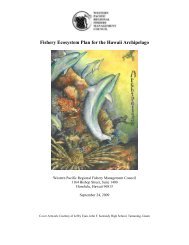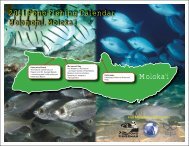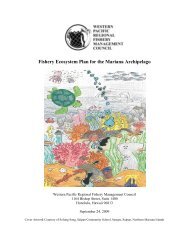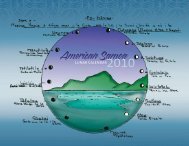Shark Depredation and Unwanted Bycatch in Pelagic Longline
Shark Depredation and Unwanted Bycatch in Pelagic Longline
Shark Depredation and Unwanted Bycatch in Pelagic Longline
You also want an ePaper? Increase the reach of your titles
YUMPU automatically turns print PDFs into web optimized ePapers that Google loves.
Chapter 1<br />
Introduction <strong>and</strong> Methods<br />
1.1. <strong>Bycatch</strong> <strong>and</strong> <strong>Depredation</strong>, <strong>Shark</strong>s <strong>and</strong> <strong>Pelagic</strong><br />
Longl<strong>in</strong>e Fisheries<br />
<strong>Bycatch</strong> 1 <strong>in</strong> mar<strong>in</strong>e fisheries is an <strong>in</strong>creas<strong>in</strong>gly prom<strong>in</strong>ent<br />
<strong>in</strong>ternational ecological, social, <strong>and</strong> economic issue (Alverson et al.,<br />
1994; IUCN, 1996a,b, 2000a,b; Hall et al., 2000; Cook, 2001; Gilman,<br />
2001; Dobrzynski et al., 2002; FAO, 1999a,b,c, 2004a,b; Gilman<br />
et al., 2005, 2006a,b,c,d, 2007). The issue has been considered<br />
<strong>in</strong> a grow<strong>in</strong>g number of <strong>in</strong>ternational conventions, treaties, <strong>and</strong><br />
resolutions, <strong>in</strong>clud<strong>in</strong>g Agenda 21 (1992); the Cancun Declaration<br />
(1992); UN General Assembly Resolutions 49/118 (1994) <strong>and</strong> 50/25<br />
(1995); the Rome Consensus on World Fisheries (1995); the Kyoto<br />
Declaration <strong>and</strong> Plan of Action (1995), the United Nations Food<br />
<strong>and</strong> Agriculture Organization International Code of Conduct for<br />
Responsible Fisheries (1995) <strong>and</strong> International Plan of Action for<br />
Reduc<strong>in</strong>g Incidental Catch of Seabirds <strong>in</strong> Longl<strong>in</strong>e Fisheries (1999),<br />
<strong>and</strong> Agreement on the Conservation of Small Cetaceans <strong>in</strong> the Baltic<br />
<strong>and</strong> North Seas Resolution on Incidental Take of Small Cetaceans<br />
(2003) (Haward et al., 1998; Hall et al., 2000; Gilman, 2001).<br />
Economic effects on fisheries from bycatch <strong>in</strong>clude the imposition of<br />
a range of restrictions, closed areas, embargos, <strong>and</strong> possible closures;<br />
fishery <strong>in</strong>teractions, where bycatch <strong>in</strong> one fishery reduces target<br />
catch <strong>in</strong> another, <strong>and</strong> bycatch of juvenile <strong>and</strong> undersized <strong>in</strong>dividuals<br />
of a commercial species can adversely affect future catch levels<br />
(Hall et al., 2000).<br />
<strong>Bycatch</strong> raises ecological concerns, as some bycatch species of<br />
mar<strong>in</strong>e mammals, seabirds, sea turtles, sharks 2 , <strong>and</strong> other fish species<br />
are particularly sensitive to <strong>in</strong>creased mortality above natural levels<br />
because of their life history traits, <strong>in</strong>clud<strong>in</strong>g be<strong>in</strong>g long-lived, hav<strong>in</strong>g<br />
delayed maturity, <strong>and</strong> hav<strong>in</strong>g low reproductive rates (Musick et al.,<br />
2000; Bonfil, 2002; Gilman et al., 2005, 2006b). <strong>Bycatch</strong> can alter biodiversity<br />
by remov<strong>in</strong>g top predators <strong>and</strong> prey species at unsusta<strong>in</strong>able<br />
levels. It also alters forag<strong>in</strong>g habits of species that learn to take<br />
advantage of discards (Hall et al., 2000).<br />
Discarded bycatch is a social issue over waste. Alverson et al. (1994)<br />
estimated that <strong>in</strong> 1994 about 27 million metric tons (27% of the<br />
world catch), rang<strong>in</strong>g between 17.9 <strong>and</strong> 39.5 million tons, of fish per<br />
year were discarded at sea. FAO (1999c) estimated that 1998 global<br />
mar<strong>in</strong>e fisheries fish discards totaled 20 million metric tons.<br />
<strong>Depredation</strong>, the partial or complete removal of hooked fish <strong>and</strong> bait<br />
from fish<strong>in</strong>g gear, is conducted primarily by cetaceans <strong>and</strong> sharks<br />
<strong>in</strong> pelagic longl<strong>in</strong>e fisheries. Economic losses from depredation can<br />
be substantial (Lawson, 2001; Nishida <strong>and</strong> Shiba, 2002). <strong>Depredation</strong><br />
also raises ecological concerns as these <strong>in</strong>teractions may change<br />
cetacean <strong>and</strong> shark forag<strong>in</strong>g behavior <strong>and</strong> distribution, <strong>in</strong>crease<br />
fish<strong>in</strong>g effort, <strong>and</strong> confound fish stock assessments, as well as result<br />
<strong>in</strong> deliberate <strong>in</strong>jury <strong>and</strong> mortality of cetaceans <strong>and</strong> sharks by fishers<br />
to discourage depredation <strong>and</strong> avoid future <strong>in</strong>teractions (Gilman et<br />
al., 2006d).<br />
1<br />
‘<strong>Bycatch</strong>’ is used <strong>in</strong> this report to refer to the reta<strong>in</strong>ed catch of non-targeted species or ‘<strong>in</strong>cidental catch’, plus all discards (McCaughran, 1992; Alverson et al., 1994). ‘Target’<br />
catch is the catch of a species or species assemblage primarily sought <strong>in</strong> a fishery, while ‘non-target’ catch is the catch of a species or species assemblage not primarily sought.<br />
‘Incidental’ catch is the portion of non-target catch that is reta<strong>in</strong>ed, while ‘discards’ is the portion of non-target catch that is not reta<strong>in</strong>ed (McCaughran, 1992; Alverson et<br />
al., 1994).<br />
2<br />
The term ‘sharks’ is generally used <strong>in</strong> this report to refer to the Chondrichthyan fishes, which comprise elasmobranchs (sharks, skates <strong>and</strong> rays) <strong>and</strong> holocephalans<br />
(chimaeroids).












